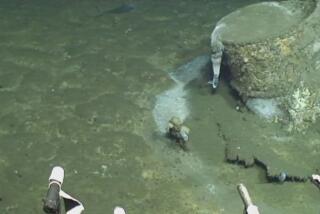Using Incinerator Ships to Get Rid of Toxic Waste
- Share via
I am writing in response to The Times article about incineration of toxic wastes at sea. I believe that incineration is an environmentally and economically sound method of waste disposal. I also wish to clear up what I perceive as fundamental misunderstandings about the toxic chemical issue.
All chemicals can be deadly. Any chemical, no matter how safe in its intended use, can kill under the proper circumstances. Toxic chemicals existed on Earth long before man. Toxic waste has been poisoning man ever since he controlled fire.
I believe that everyone prospers and that only a small percentage suffer from modern man’s advances in chemistry. Today we live in a society in which chemicals are routinely used: to wash ourselves and our children, to make our clothing, to build our homes and to maintain our standard of living are considered safe and useful until they are discarded.
Toxic waste is not just black ooze seeping from rusty barrels behind abandoned chemical plants. It is ubiquitous. For example, a single bottle of a prescription dandruff shampoo contaminates thousands of gallons of water with selenium at birth defect-causing levels, yet people continue to use it. Besides the thousands of people poisoned, blinded and killed by the misuse of chemicals, many people generate and are exposed to potential toxins during routine everyday life.
Industry generates the largest share of toxic wastes and has the proper facilities and personnel for their handling. The people who generate the wastes are responsible for their disposal, yet remember that unless we return to the Stone Age these wastes will continue to be generated.
What can we do? Large areas of our environment have already been contaminated and we must provide for the safe disposal for our wastes of the present and future.
1--Industry must make every effort to reduce the amount of the waste it puts out. This is our best chance of reducing the volume of the problem before it becomes a problem.
2--We must reduce the amount of waste that must be buried in our soil no matter how apparently permanent these sites are. Any organic (carbon-containing) material can be permanently destroyed by proper incineration. Any acidic or basic waste can be neutralized. Many petrochemical wastes can be permanently destroyed with microorganisms. Through active recycling programs and proper incineration urban refuse can be reduced in volume by a factor of 10. What is left over must be buried.
3--Legal waste disposal must be easily available and illegal disposal must be severely dealt with.
Without incentive for proper disposal, it is just too easy to dump it down the drain. We have the technology, and to succeed we must intercept human greed and the useless sacrifice of our environment for the lure of a few dollars profit. This is a vast and immensely difficult problem.
Hopefully, for all of our sake we can come up with a solution.
TIM SHEPODD
Pasadena
More to Read
Sign up for The Wild
We’ll help you find the best places to hike, bike and run, as well as the perfect silent spots for meditation and yoga.
You may occasionally receive promotional content from the Los Angeles Times.






